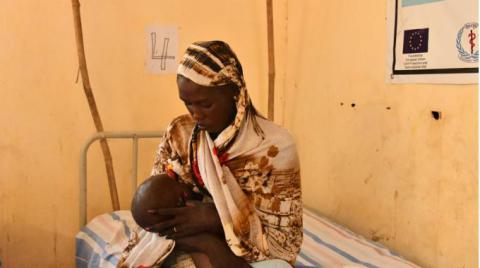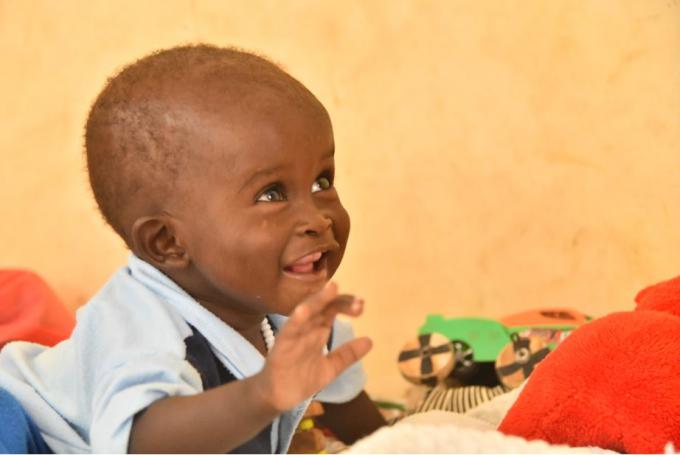My dying child survived because of the support from Save the Children, says mother of five.
Nyankiir*, 28, was worried about her child who has complicated childhood illness. Upon arrival at Save the Children Primary Health Care Centre (PHCC) in Abyei, South Sudan, her child, Lual, 7 months, was treated successful by Save the Children health team. Thanks to the European Union Humanitarian Aid for the support.
Watch the video here. Credit: Ezibon Saadalla/Save the Children.
Abyei, South Sudan - Every Breath Counts but in South Sudan progress to address the number of children dying from pneumonia and complicate childhood diseases isn’t fast enough. It is the poorest children like Lual*, 7 months, who is most at risk because of malnutrition, and lack of access to basic quality health services for diagnosis & treatment.
Lual lost one of his 5 brothers to pneumonia in Abyei, South Sudan where childhood diseases and malnutrition is on rise impacted by conflict, hunger, drought flooding and series of cattle raiding. When Lual become sick, his mother, Nyankiir* 28, was so worried that her 7 months old baby could not survive from Pneumonia. Baby Lual has pneumonia, malaria and was severely malnourished.
Nyankiir, believes her child’s situation worsened due to poor feeding and that her body is unable to generate enough breast milk to help feed her child. They live on livestock and green vegetables which was impacted by conflict, hunger, drought flooding and series of cattle raiding. This led to increase in acute malnutrition and childhood diseases.
7 months old Lual survived pneumonia, malaria and malnutrition.
Nyankiir lost hope for baby Lual while rushing him to the nearest Save the Children Out Patient medical facility. Lual’s case was complicated and he was referred to a Stabilization centre in Abyei Hospital, also managed by Save the Children.
Save the Children staff provided urgent diagnosis to treat Lual’s pneumonia, malaria and malnutrition. His mother was stressed and was also given pchyschosocial support for losing hope that her child couldn’t survive. Nyankiir* and her son Lual* were admitted at Save the Children’s Stabilization Centre for one week for Lual to survive and was discharged home. They are now at home living their normal and usual life healthy.
Lual, 7 months. Photo: Ezibon Saadalla/Save the Children
Save the Children treated Lual from malaria, pneumonia and malnutrition. Save the Children also provided psychosocial support to Lual’s mother who was stressed of her baby’s condition so she is stable. Save the Children provided follow up of children undergoing treatment like Lual for further advice. Lual’s mother/parents were also educated on malnutrition screening for children under five, referral of a child with danger signs like Lual to health facility, and proper keeping of the children at home.
Nyankiir, said:
“Single mother of 28 years old taking care of 4 children isn’t easy, there is no enough food to feed my children. When my child was brought to Save the Children Stabilization centre, I thought I was going to lose my child because he was hardly breathing, the nurses seems worried, this made me cry and remember my son who died of the same complication. Now my child treated and is fine at home.
Background / Project information
Abyei Special Administrative Area has long been disputed territory between South Sudan and Sudan. It has greatly suffered because of the wars between the two countries. This has left most of Abyei people crumbled, neglected and its population forgotten. There are no free primary healthcare providers apart from Save the Children and other limited humanitarian response actors.
Save the Children is implementing life-saving health and nutrition interventions project in Abyei funded by European Union Humanitarian Aid. The program provides free lifesaving primary healthcare services whilst, nutrition, food security and livelihood. The response also strengthens the capacity of the local health system to prevent, detect, and respond to outbreaks of common epidemic prone diseases.
Written by Ezibon Saadalla/Save the Children
Edited by Tito Justin/Save the Children
 South Sudan
South Sudan 
